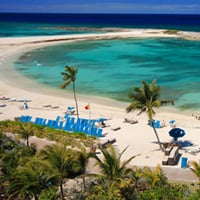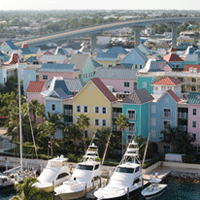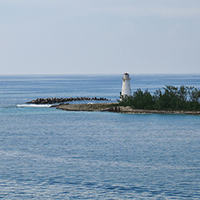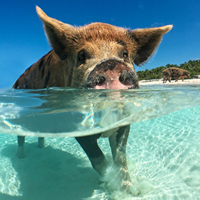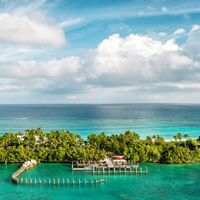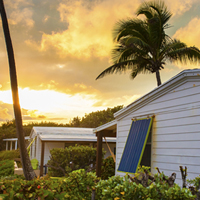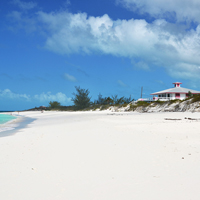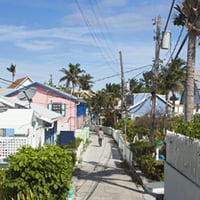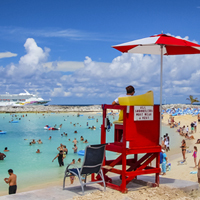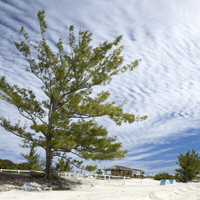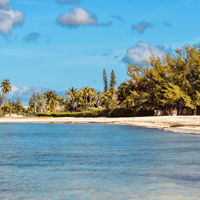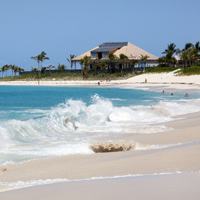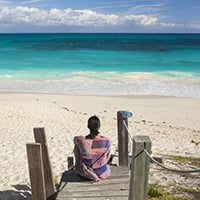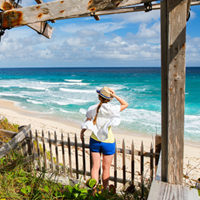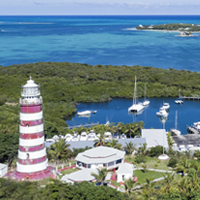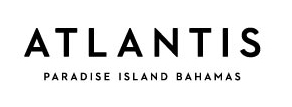Bahamas
Coastal BeachesThe Bahamas is an archipelago consisting of around 700 islands and over 2,000 rocks and cays, located in the Atlantic Ocean, to the north of Cuba and Hispaniola, and to the northwest of the Turks and Caicos Islands. Known for its rich maritime history, the Bahamas was once a haven for pirates and privateers before becoming a British colony in the 18th century. Today, it is a sovereign country with a parliamentary democracy and a thriving tourism industry, celebrated for its stunning natural beauty, crystal-clear waters, and vibrant culture. Nassau, the capital city, is located on New Providence Island and is the commercial hub of the country, offering a mix of historical sites, modern amenities, and a bustling cruise port. The Bahamas is renowned for its diverse marine life, which includes dolphins, sharks, and the famous swimming pigs of Exuma. The islands' economy is heavily dependent on tourism and financial services. The Bahamian culture is a unique blend of African, European, and indigenous influences, reflected in its music, dance, and festivals, such as Junkanoo. The climate is tropical, with a wet and dry season, and the country is often in the path of hurricanes. Despite its natural beauty, the Bahamas faces challenges such as environmental threats to its coral reefs and the impact of climate change on its low-lying islands. Nevertheless, the spirit of the Bahamian people remains resilient and welcoming to the many visitors who come to experience the islands' laid-back lifestyle and natural wonders.
 PassportCard Expat Health Insurance
PassportCard Expat Health InsuranceGet Quote
Never worry about paying your medical bills out of pocket again. The innovative PassportCard allows for a stress-free experience for all expat families, remote travelers, and workers. With a 24/7 customer service and an outstanding customer base of over 2 Million clients, it will feel like medical care at home. Get up to 10% off on your policy now.
 PassportCard Expat Health Insurance
PassportCard Expat Health InsuranceNever worry about paying your medical bills out of pocket again. The innovative PassportCard allows for a stress-free experience for all expat families, remote travelers, and workers. With a 24/7 customer service and an outstanding customer base of over 2 Million clients, it will feel like medical care at home. Get up to 10% off on your policy now.
Get Quote
Living in Bahamas
Best Places to Live in Bahamas
Visa & Residency
The Bahamas offers several residency options for expatriates, including the Permanent Residence Permit and the Annual Residence Permit. The process of obtaining residency in the Bahamas can be considered average in terms of difficulty, but it does require the submission of various documents and adherence to the country's policies. To apply for a Permanent Residence Permit, expatriates must demonstrate financial independence and may be required to invest in property in the Bahamas. This type of permit is particularly popular among retirees and those who can afford to invest in the local real estate market. The investment threshold is usually quite high, and owning a residence in the Bahamas is a significant factor in the approval process. The Annual Residence Permit is another option, which is suitable for individuals who wish to reside in the Bahamas for a year at a time. This permit is popular among digital nomads and those who do not wish to make a permanent move to the country. To obtain this permit, applicants must provide evidence of financial self-sufficiency and may need to show a rental agreement or property ownership in the Bahamas. Both types of permits require applicants to submit a completed application form, a passport-sized photo, a valid passport, proof of financial independence (such as bank statements), and a medical certificate confirming good health. Additional documents, such as a police certificate, may also be required to prove the absence of a criminal record. The process involves submitting the application to the Department of Immigration and paying the relevant fees. The time frame for processing can vary, and it is advisable to apply well in advance of the intended move date. Once granted, the Permanent Residence Permit does not typically need to be renewed, while the Annual Residence Permit must be renewed each year. Overall, while the process is bureaucratic and requires various forms of documentation and potentially a significant financial investment, it is relatively straightforward for those who meet the criteria. Expatriates are encouraged to seek legal advice or assistance from a local immigration attorney to navigate the process effectively.
Healthcare in Bahamas
The Bahamas has a mixed healthcare system with both public and private healthcare facilities. The public healthcare system is accessible to all Bahamian residents and is funded by the government, providing a range of services from primary care to specialized treatments. However, the quality of public healthcare can vary, with some facilities facing challenges such as limited resources, long wait times, and occasional shortages of medical supplies. In contrast, private healthcare in the Bahamas offers higher quality services with more modern facilities and shorter wait times, but at a significantly higher cost. Expats and digital nomads can access public healthcare once they have legal residency status, but many opt for private health insurance to cover private healthcare costs. It is advisable for expats and digital nomads to have comprehensive health insurance to ensure access to the best medical care.
Cost of Living
The cost of living in the Bahamas is considered high, particularly due to the importation of most goods and the focus on tourism which drives up prices in popular areas.
Weather
The Bahamas experiences a tropical climate with warm to hot temperatures year-round, moderated by the trade winds. There is a wet season from May to October and a dry season from November to April. Hurricanes can affect the weather during the Atlantic hurricane season, which runs from June to November.
Educational System in Bahamas
The educational system in the Bahamas is influenced by the British system and is compulsory between the ages of 5 and 16. Education in the Bahamas is managed by the Ministry of Education, Science and Technology. The school year in the Bahamas typically starts in September and ends in June, and it is divided into three terms. Children begin their education with two years of preschool, followed by six years of primary education, starting at age 5. After primary school, students move on to three years of lower secondary education and then two years of upper secondary education, where they can choose to follow an academic or vocational track. The Bahamas General Certificate of Secondary Education (BGCSE) is taken after the completion of secondary education, and it is the equivalent of the British GCSE. The country also offers tertiary education through colleges and vocational schools. The quality of education in the Bahamas is generally considered good, with a literacy rate of over 95%. However, there can be disparities in educational quality and resources between urban and rural areas. Private and international schools are available, offering different curricula and often catering to expatriate families. These schools may follow American or British educational models and can provide a more familiar environment for children from those countries
Copyright 1997-2025 Burlingame Interactive, Inc.

